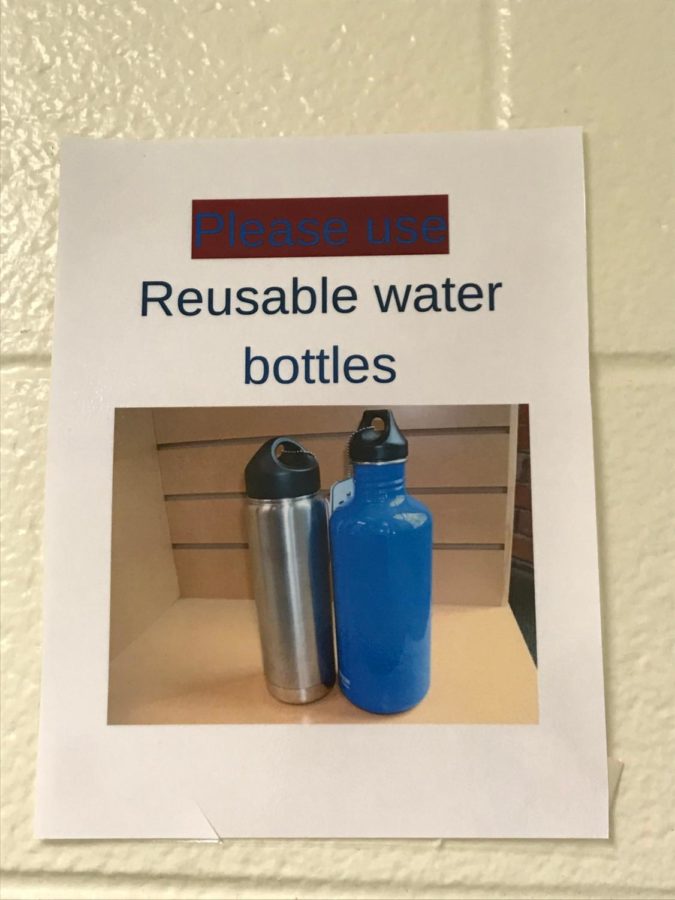Ban The Bottles
June 17, 2019
The plastic problem we currently face is widespread. Many elements contained in the plastic are harmful to human health, plastic pollution is crowding the ocean and destroying marine life, and a huge amount of petroleum goes into the production of the plastic.
For these reasons schools, colleges, and businesses have pledged not to sell these bottles, in an attempt to become more environmentally friendly. Hunterdon Central continues to sell plastic bottles, and according to cafeteria workers at a rate of an estimated 400 per day. However the HC Environmental Society has other plans, looking to limit, and possibly end all plastic bottle sales at HC.
Bonnie Berenger Interview-
Bonnie Berenger, the passionate advisor of the Hunterdon Central Environmental Society, looks to limit HC’s plastic usage. With her guidance, the environmental society has been able to come up with a good solution to help combat the amount of plastic being sold and distributed on Central’s campus.
They have purchased mira water bottles and have been selling them to students at water bottle sales. This is a very important because Ms. Berenger says “Only a third of the plastic water bottles are recycled here at Hunterdon Central”. They have brought this idea of reusable water bottles to the attention of Mrs. Manfredi, the vice principal to all grades here at Hunterdon Central. She has been very supportive of the idea thus far, leading to the hope for the environmental society that there will be positive, clean change here at Hunterdon Central.
Stephanie Brody Interview-
Stephanie Brody, the student president of the Hunterdon Central Environmental Society, works to reduce and possibly eliminate plastic usage and make recycling effective at central.
They have made tremendous efforts to get to their goal, they have purchased mira water bottles and have been selling them to students at water bottle sales. (Anyone interested in these water bottles can purchase one from Stephanie or Ms. Berenger.)
They also created multiple commercials which aired on HCTV and posters for the bulletin boards near the 9/10 stair entrance and have even adopted a road (Case Boulevard)! These posters inform students about recycling and the negative impact of plastic bottles.
But while they have been making steps towards their goal, Stephanie said they do face many obstacles at this school. She says, “The school stores their recycling bins in inaccessible areas so sometimes students only option is to throw all their trash in a landfill bin”. A tricky rule that janitors must follow is that if there is any piece of garbage that isn’t plastic in a recycling bin they have to throw the whole bag of “recyclables” in with the regular garbage.
So it really is up to the students and staff at this school to make a difference in the environment. It is a team effort, and that is a category that Hunterdon Central thrives in.
Staff In General
After contacting Pomptonian Food, Hunterdon Central’s cafeteria provider, we were initially met with success. However after pressing deeper into the questions, we received no response.
As soon as we began to ask questions, for example “How much money does the food service make annually from selling plastic bottles?”, “How much of the plastic you sell is recycled on campus?” and “When does the food service’s current contract with the school end?” we received no response.
We never got a response from this source to our questions. Which leads up to believe that there is more to the plastic bottle story than we could ever have anticipated. We encourage our readers to dig deeper and consider this issue.
Resolution-
During our interviews we found a lot of eye raising information which we were able to use to dig into the deep rooted environmental issues at Central.We attempted to shed light on a problem that has habitually been ignored, but is quickly becoming a bigger problem than just on Central’s campus too. As the HC Environmental Society’s president highlighted, the solution to the problem lies with the students willingness and desire to limit their personal plastic use.
